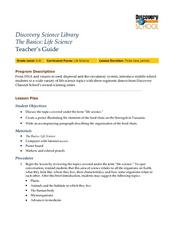Curated OER
Life in the Crystal Palace
Marine biologists research sea ice communities. Assign some groups to construct paper models of sea ice communities in winter, and some to construct models of them in summer. The lesson is simplistic, but the Internet resources provided...
Curated OER
Turning the Tide on Trash: Marine Debris Curriculum
Six different lessons comprise this unit on marine debris. Science, language arts, social studies, and art projects make this an ideal interdisciplinary unit. The result will be well-informed future citizens who can help make a...
American Farm Bureau Foundation for Agriculture
My Miniature Greenhouse!
Here is an activity that will peak your super scientists' interest and knowledge of greenhouse gardening. Green thumbs flourish when they build, prepare, take care of, and observe their seedlings inside a miniature greenhouse. With...
Consortium for Ocean Science Exploration and Engagement (COSEE)
Life Cycle of Blue King Crabs
The blue king crab and the red king crab live in the same range but never in the same region. The third lesson in the series of five focuses on the blue king crab and the impact the changes in water temperature is having on its habitat....
Curated OER
Home Living/ Daily Living: Cooking Mastery
Learning to cook, follow directions, and presenting information are skills every body needs to know. Learners complete a recipe-in-a-jar activity to hone these life skills. They follow the directions, choose and use correct measurement...
Ocean Explorer
Architects of the Coral Reef
Coral Reefs are the focus of a life science lesson plan. Upper graders look at how coral reefs are formed, how the animals and plants reproduce, and the variety of ways that humans benefit from coral reefs around the world. Groups of...
Baylor College
Milestones in Microbiology
Life science learners read a set of six short Discovery Readings that describe historical events in the field of microbiology. For each, they identify clues about when the event occurred and then they try to arrange events in...
Agriculture in the Classroom
Six Kinds Do It All
Teach young engineers that all machines, no matter how complicated or complex, are made up of just six simple devices with this hands-on physical science lesson. Using the included templates, students first create paper models of...
National Wildlife Federation
What's Your Habitat?
How are third graders like rabbits? They both live in habitats and require food, water, and shelter to survive! An educational science lesson encourages your learners to think about their own habitats and survival needs, before comparing...
Education Outside
Life Cycle of Compost
As part of a study of the life cycle of compost, class members examine the differences between green waste disposal and backyard composting.
PBS
The Ocean and Climate: Heat Redistribution
Here on Earth, heat goes with the flow! Young climatologists dive in to the connection between ocean currents and heat distribution during a science lesson. Scholars work with interactive and print resources to create a thorough...
California Academy of Science
A Day in the Life of a San Francisco Native Animal
Before Google, before Sillicon Valley, before the Gold Rush, the San Francisco landscape was a biome filled with grizzly bears, mule deer, tule elk, coyotes, gray fox, gophers, and moles. To explore the early days of yesteryear, kids...
Curated OER
The Life Cycle of Butterflies, Day 1
Describe each stage in the life cycle of a butterfly. Second graders will identify the stages of the life cycle of the butterfly, using correct vocabulary. They will also share their new understandings about the stages of the life cycle...
Curated OER
Science Lessons for Grade 7
Seventh graders construct a food chain based on pictures shown on the board. In this biology lesson, 7th graders describe the motion of particles as energy is changed. They explain how pH changes during neutralization.
Baylor College
Fuel for Living Things
During a three-part instructional activity, learners make a cabbage juice pH indicator and use it to analyze the waste products of yeast after feeding them with sugar. The intent is to demonstrate how living organisms produce carbon...
Baylor College
Infectious Disease Case Study
Small groups of life science learners look at Allison's symptoms and discuss a diagnosis. They use a chart of illnesses and draw symptom clues from an envelope to determine what illness she has. A lesson like this gives children an...
Steve Spangler Science
Halloween Dry Ice Secrets
Want to use dry ice in your classroom this Halloween but you're not sure how? A thorough packet of 13 dry ice activities showcases engaging ways to bring chemistry to life this October.
Curated OER
Lesson Plan: Humans and the Land
Art acts as inspiration for a conversation about human impact on the environment and creative writing. The class examines three pieces, looking for evidence of human impact on the landscape. They then write a first-person narrative, from...
Curated OER
The Ocean
Plant and animal life of the ocean is the focus of this science lesson. Young scientists sort a variety of seashells and explore why many sea animals have shells. They examine the shells, write journal entries highlighting the...
Coastal Carolina University
Osmosis and Diffusion Lab: Honey I Blew Up the Bear
Beginning biologists explore passive transport through two demonstrations and a hands-on inquiry. Spray air freshener from one spot in the classroom and have class members raise their hands as the scent reaches them. Also, place a teabag...
Curated OER
The Basics: Life Science
Students develop an understanding of the different fields of study that are encompassed by the term, life science. They view and discuss a video on the topic. In small groups they focus on on of the examples shown in the video to create...
Curated OER
Unit 1: Water is Life: The Heart and Science Behind this Phrase
Water, water, everywhere — but will there be enough to drink? Check out these detailed lesson plans to meet NGSS water cycle and CCSS literacy standards in your science classroom. Learners do a close reading of a challenging, poetic text...
NASA
Is It Alive?
Determining whether or not something is living can be more difficult than it seems. Put your young scientists to work defining their own criteria to identify life, then work with three samples to see if they are alive or not.
Institute of Electrical and Electronics Engineers
Life Vest Challenge
After reading about the history and science of personal floatation devices, patents, and intellectual property, engineering teams design a life vest for a can of soup. To evaluate which groups considered the need for waterproofing, hold...

























